Case Study Reflection: Unprofessional Conduct in Nursing Practice
VerifiedAdded on 2022/08/17
|5
|1317
|27
Case Study
AI Summary
This case study examines a case of unprofessional conduct by a nurse, detailing multiple instances of negligence and errors in patient care. The nurse failed to document post-operative assessments, communicate vital information to other staff, and adhere to proper procedures for medication administration and wound care. The analysis highlights the critical importance of accurate documentation, effective communication, and adherence to ethical standards in nursing practice. The nurse's actions resulted in potential risks to patient safety, including medication errors, incorrect wound care, and inadequate preparation for procedures. The case study also reflects on the impact of such incidents on the healthcare team and the importance of maintaining professional integrity. The author, a hospital unit clerk, shares their perspective on the events and the significance of ethical healthcare practices.
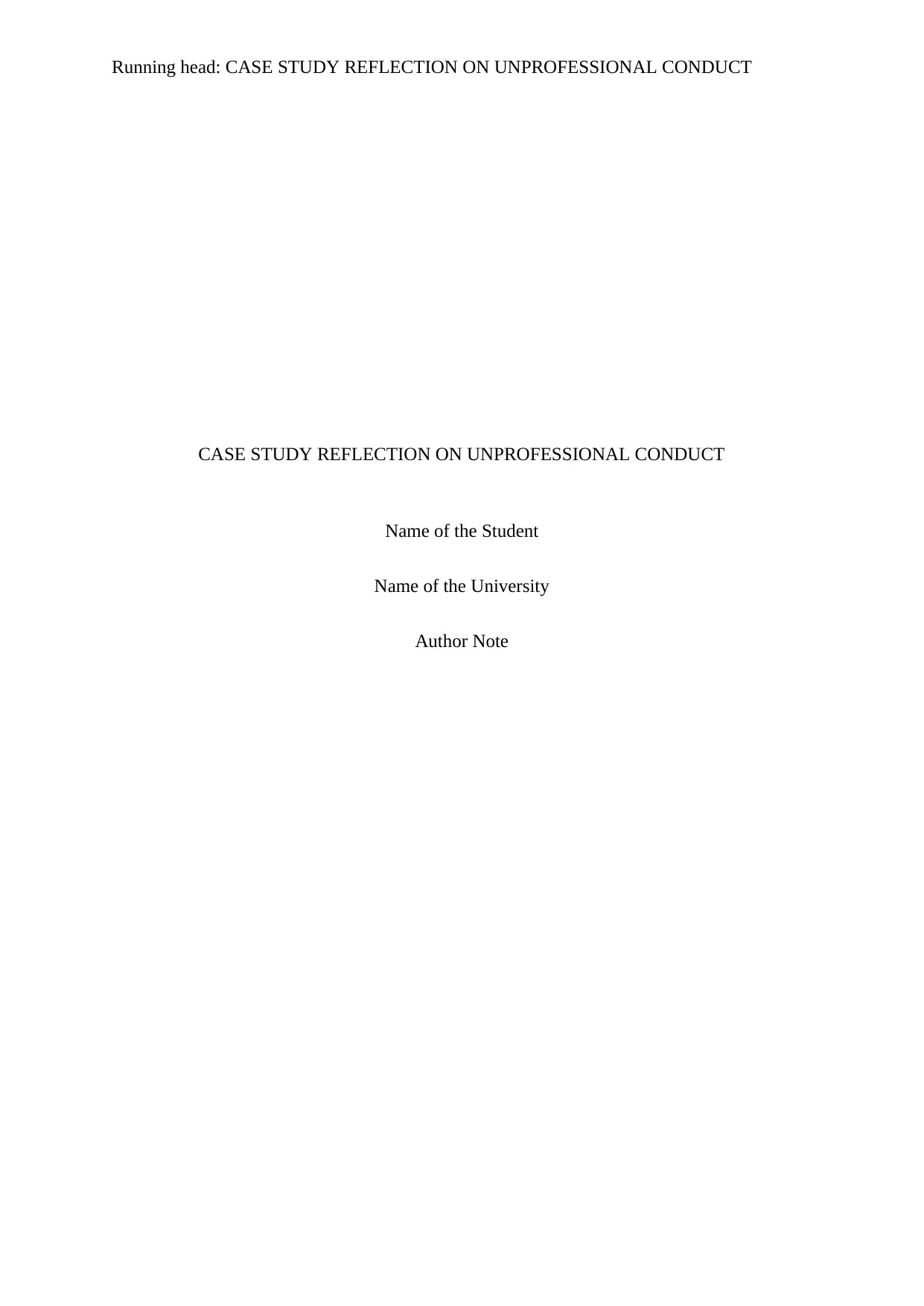
Running head: CASE STUDY REFLECTION ON UNPROFESSIONAL CONDUCT
CASE STUDY REFLECTION ON UNPROFESSIONAL CONDUCT
Name of the Student
Name of the University
Author Note
CASE STUDY REFLECTION ON UNPROFESSIONAL CONDUCT
Name of the Student
Name of the University
Author Note
Paraphrase This Document
Need a fresh take? Get an instant paraphrase of this document with our AI Paraphraser
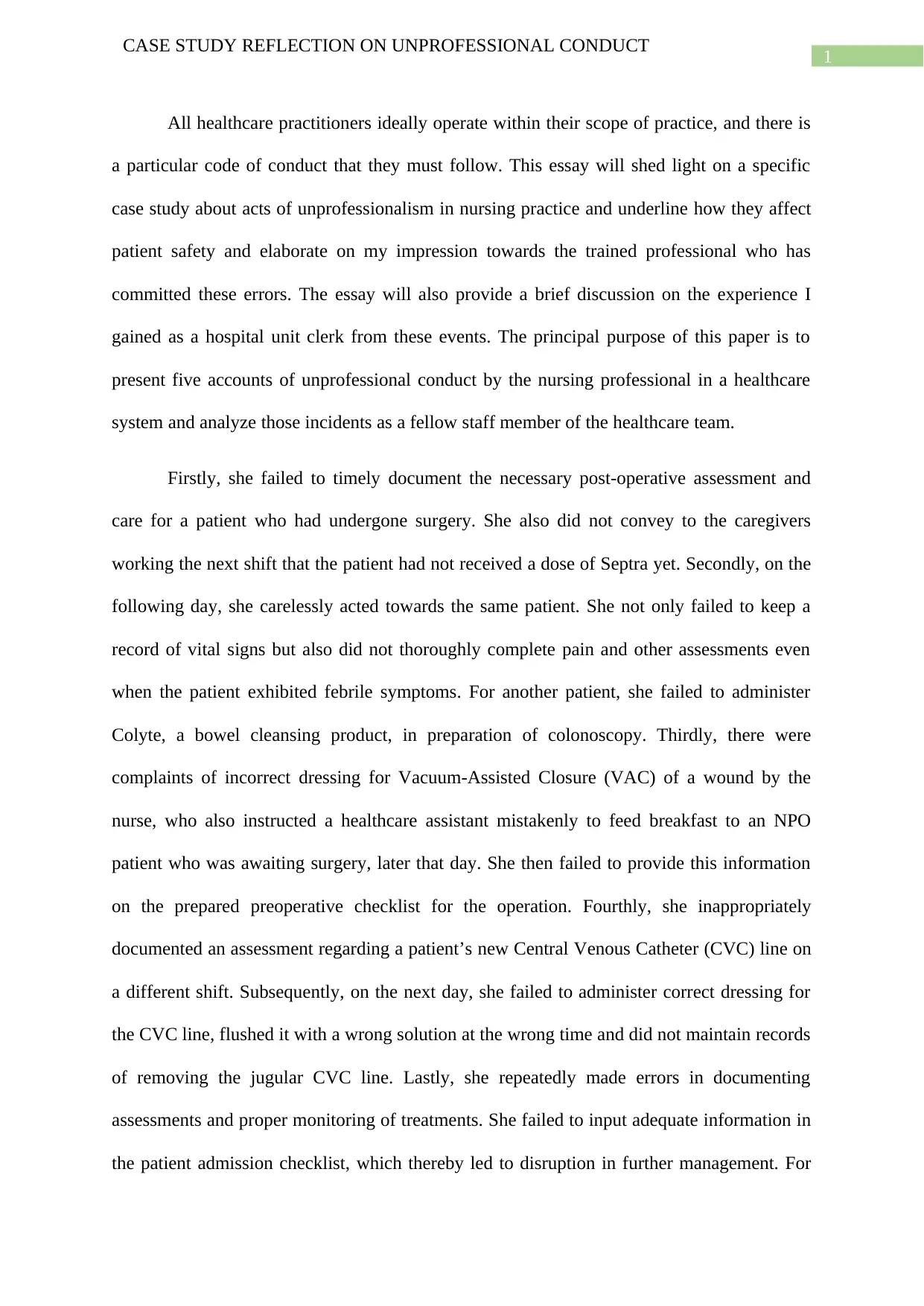
1
CASE STUDY REFLECTION ON UNPROFESSIONAL CONDUCT
All healthcare practitioners ideally operate within their scope of practice, and there is
a particular code of conduct that they must follow. This essay will shed light on a specific
case study about acts of unprofessionalism in nursing practice and underline how they affect
patient safety and elaborate on my impression towards the trained professional who has
committed these errors. The essay will also provide a brief discussion on the experience I
gained as a hospital unit clerk from these events. The principal purpose of this paper is to
present five accounts of unprofessional conduct by the nursing professional in a healthcare
system and analyze those incidents as a fellow staff member of the healthcare team.
Firstly, she failed to timely document the necessary post-operative assessment and
care for a patient who had undergone surgery. She also did not convey to the caregivers
working the next shift that the patient had not received a dose of Septra yet. Secondly, on the
following day, she carelessly acted towards the same patient. She not only failed to keep a
record of vital signs but also did not thoroughly complete pain and other assessments even
when the patient exhibited febrile symptoms. For another patient, she failed to administer
Colyte, a bowel cleansing product, in preparation of colonoscopy. Thirdly, there were
complaints of incorrect dressing for Vacuum-Assisted Closure (VAC) of a wound by the
nurse, who also instructed a healthcare assistant mistakenly to feed breakfast to an NPO
patient who was awaiting surgery, later that day. She then failed to provide this information
on the prepared preoperative checklist for the operation. Fourthly, she inappropriately
documented an assessment regarding a patient’s new Central Venous Catheter (CVC) line on
a different shift. Subsequently, on the next day, she failed to administer correct dressing for
the CVC line, flushed it with a wrong solution at the wrong time and did not maintain records
of removing the jugular CVC line. Lastly, she repeatedly made errors in documenting
assessments and proper monitoring of treatments. She failed to input adequate information in
the patient admission checklist, which thereby led to disruption in further management. For
CASE STUDY REFLECTION ON UNPROFESSIONAL CONDUCT
All healthcare practitioners ideally operate within their scope of practice, and there is
a particular code of conduct that they must follow. This essay will shed light on a specific
case study about acts of unprofessionalism in nursing practice and underline how they affect
patient safety and elaborate on my impression towards the trained professional who has
committed these errors. The essay will also provide a brief discussion on the experience I
gained as a hospital unit clerk from these events. The principal purpose of this paper is to
present five accounts of unprofessional conduct by the nursing professional in a healthcare
system and analyze those incidents as a fellow staff member of the healthcare team.
Firstly, she failed to timely document the necessary post-operative assessment and
care for a patient who had undergone surgery. She also did not convey to the caregivers
working the next shift that the patient had not received a dose of Septra yet. Secondly, on the
following day, she carelessly acted towards the same patient. She not only failed to keep a
record of vital signs but also did not thoroughly complete pain and other assessments even
when the patient exhibited febrile symptoms. For another patient, she failed to administer
Colyte, a bowel cleansing product, in preparation of colonoscopy. Thirdly, there were
complaints of incorrect dressing for Vacuum-Assisted Closure (VAC) of a wound by the
nurse, who also instructed a healthcare assistant mistakenly to feed breakfast to an NPO
patient who was awaiting surgery, later that day. She then failed to provide this information
on the prepared preoperative checklist for the operation. Fourthly, she inappropriately
documented an assessment regarding a patient’s new Central Venous Catheter (CVC) line on
a different shift. Subsequently, on the next day, she failed to administer correct dressing for
the CVC line, flushed it with a wrong solution at the wrong time and did not maintain records
of removing the jugular CVC line. Lastly, she repeatedly made errors in documenting
assessments and proper monitoring of treatments. She failed to input adequate information in
the patient admission checklist, which thereby led to disruption in further management. For
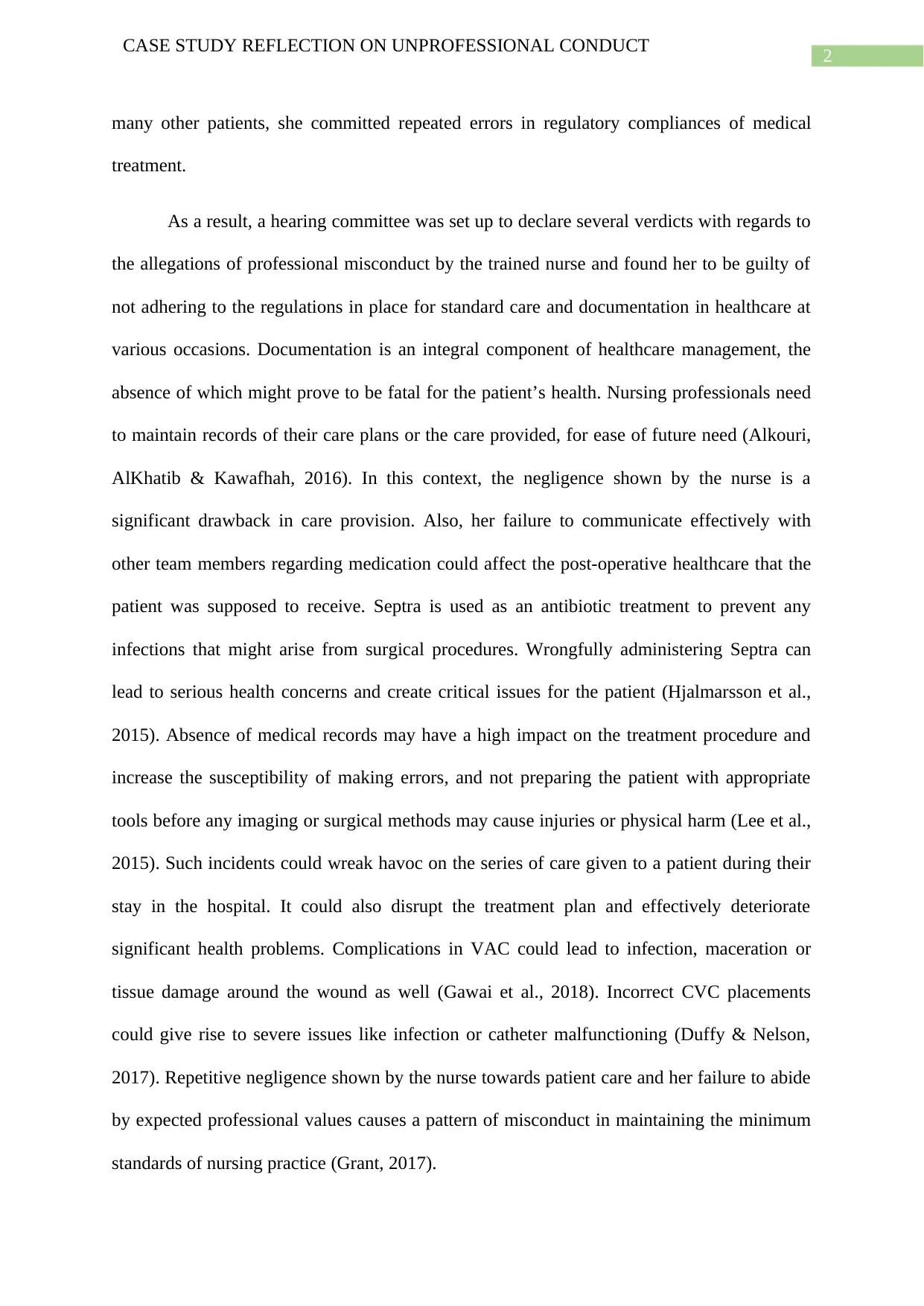
2
CASE STUDY REFLECTION ON UNPROFESSIONAL CONDUCT
many other patients, she committed repeated errors in regulatory compliances of medical
treatment.
As a result, a hearing committee was set up to declare several verdicts with regards to
the allegations of professional misconduct by the trained nurse and found her to be guilty of
not adhering to the regulations in place for standard care and documentation in healthcare at
various occasions. Documentation is an integral component of healthcare management, the
absence of which might prove to be fatal for the patient’s health. Nursing professionals need
to maintain records of their care plans or the care provided, for ease of future need (Alkouri,
AlKhatib & Kawafhah, 2016). In this context, the negligence shown by the nurse is a
significant drawback in care provision. Also, her failure to communicate effectively with
other team members regarding medication could affect the post-operative healthcare that the
patient was supposed to receive. Septra is used as an antibiotic treatment to prevent any
infections that might arise from surgical procedures. Wrongfully administering Septra can
lead to serious health concerns and create critical issues for the patient (Hjalmarsson et al.,
2015). Absence of medical records may have a high impact on the treatment procedure and
increase the susceptibility of making errors, and not preparing the patient with appropriate
tools before any imaging or surgical methods may cause injuries or physical harm (Lee et al.,
2015). Such incidents could wreak havoc on the series of care given to a patient during their
stay in the hospital. It could also disrupt the treatment plan and effectively deteriorate
significant health problems. Complications in VAC could lead to infection, maceration or
tissue damage around the wound as well (Gawai et al., 2018). Incorrect CVC placements
could give rise to severe issues like infection or catheter malfunctioning (Duffy & Nelson,
2017). Repetitive negligence shown by the nurse towards patient care and her failure to abide
by expected professional values causes a pattern of misconduct in maintaining the minimum
standards of nursing practice (Grant, 2017).
CASE STUDY REFLECTION ON UNPROFESSIONAL CONDUCT
many other patients, she committed repeated errors in regulatory compliances of medical
treatment.
As a result, a hearing committee was set up to declare several verdicts with regards to
the allegations of professional misconduct by the trained nurse and found her to be guilty of
not adhering to the regulations in place for standard care and documentation in healthcare at
various occasions. Documentation is an integral component of healthcare management, the
absence of which might prove to be fatal for the patient’s health. Nursing professionals need
to maintain records of their care plans or the care provided, for ease of future need (Alkouri,
AlKhatib & Kawafhah, 2016). In this context, the negligence shown by the nurse is a
significant drawback in care provision. Also, her failure to communicate effectively with
other team members regarding medication could affect the post-operative healthcare that the
patient was supposed to receive. Septra is used as an antibiotic treatment to prevent any
infections that might arise from surgical procedures. Wrongfully administering Septra can
lead to serious health concerns and create critical issues for the patient (Hjalmarsson et al.,
2015). Absence of medical records may have a high impact on the treatment procedure and
increase the susceptibility of making errors, and not preparing the patient with appropriate
tools before any imaging or surgical methods may cause injuries or physical harm (Lee et al.,
2015). Such incidents could wreak havoc on the series of care given to a patient during their
stay in the hospital. It could also disrupt the treatment plan and effectively deteriorate
significant health problems. Complications in VAC could lead to infection, maceration or
tissue damage around the wound as well (Gawai et al., 2018). Incorrect CVC placements
could give rise to severe issues like infection or catheter malfunctioning (Duffy & Nelson,
2017). Repetitive negligence shown by the nurse towards patient care and her failure to abide
by expected professional values causes a pattern of misconduct in maintaining the minimum
standards of nursing practice (Grant, 2017).
⊘ This is a preview!⊘
Do you want full access?
Subscribe today to unlock all pages.

Trusted by 1+ million students worldwide
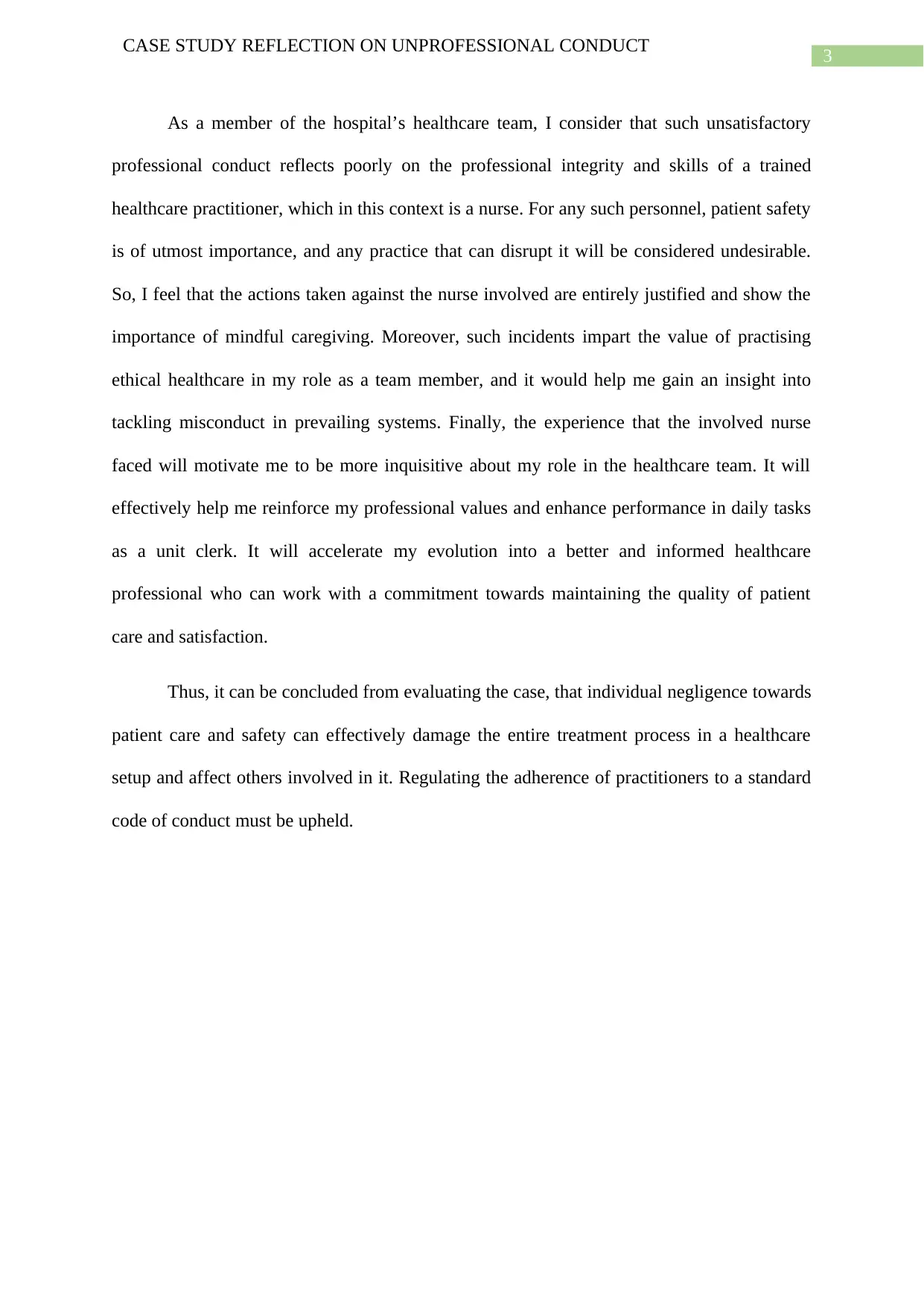
3
CASE STUDY REFLECTION ON UNPROFESSIONAL CONDUCT
As a member of the hospital’s healthcare team, I consider that such unsatisfactory
professional conduct reflects poorly on the professional integrity and skills of a trained
healthcare practitioner, which in this context is a nurse. For any such personnel, patient safety
is of utmost importance, and any practice that can disrupt it will be considered undesirable.
So, I feel that the actions taken against the nurse involved are entirely justified and show the
importance of mindful caregiving. Moreover, such incidents impart the value of practising
ethical healthcare in my role as a team member, and it would help me gain an insight into
tackling misconduct in prevailing systems. Finally, the experience that the involved nurse
faced will motivate me to be more inquisitive about my role in the healthcare team. It will
effectively help me reinforce my professional values and enhance performance in daily tasks
as a unit clerk. It will accelerate my evolution into a better and informed healthcare
professional who can work with a commitment towards maintaining the quality of patient
care and satisfaction.
Thus, it can be concluded from evaluating the case, that individual negligence towards
patient care and safety can effectively damage the entire treatment process in a healthcare
setup and affect others involved in it. Regulating the adherence of practitioners to a standard
code of conduct must be upheld.
CASE STUDY REFLECTION ON UNPROFESSIONAL CONDUCT
As a member of the hospital’s healthcare team, I consider that such unsatisfactory
professional conduct reflects poorly on the professional integrity and skills of a trained
healthcare practitioner, which in this context is a nurse. For any such personnel, patient safety
is of utmost importance, and any practice that can disrupt it will be considered undesirable.
So, I feel that the actions taken against the nurse involved are entirely justified and show the
importance of mindful caregiving. Moreover, such incidents impart the value of practising
ethical healthcare in my role as a team member, and it would help me gain an insight into
tackling misconduct in prevailing systems. Finally, the experience that the involved nurse
faced will motivate me to be more inquisitive about my role in the healthcare team. It will
effectively help me reinforce my professional values and enhance performance in daily tasks
as a unit clerk. It will accelerate my evolution into a better and informed healthcare
professional who can work with a commitment towards maintaining the quality of patient
care and satisfaction.
Thus, it can be concluded from evaluating the case, that individual negligence towards
patient care and safety can effectively damage the entire treatment process in a healthcare
setup and affect others involved in it. Regulating the adherence of practitioners to a standard
code of conduct must be upheld.
Paraphrase This Document
Need a fresh take? Get an instant paraphrase of this document with our AI Paraphraser
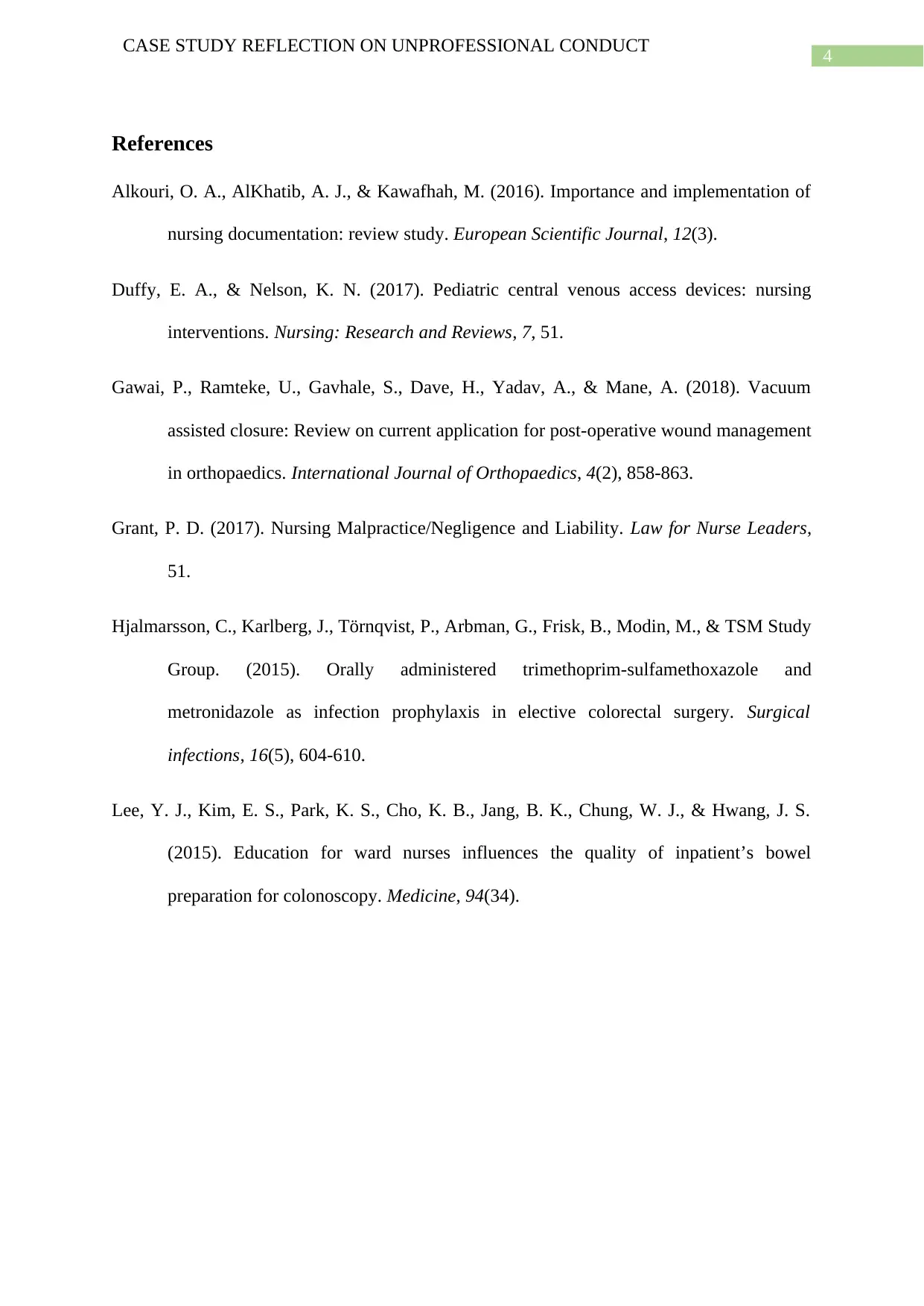
4
CASE STUDY REFLECTION ON UNPROFESSIONAL CONDUCT
References
Alkouri, O. A., AlKhatib, A. J., & Kawafhah, M. (2016). Importance and implementation of
nursing documentation: review study. European Scientific Journal, 12(3).
Duffy, E. A., & Nelson, K. N. (2017). Pediatric central venous access devices: nursing
interventions. Nursing: Research and Reviews, 7, 51.
Gawai, P., Ramteke, U., Gavhale, S., Dave, H., Yadav, A., & Mane, A. (2018). Vacuum
assisted closure: Review on current application for post-operative wound management
in orthopaedics. International Journal of Orthopaedics, 4(2), 858-863.
Grant, P. D. (2017). Nursing Malpractice/Negligence and Liability. Law for Nurse Leaders,
51.
Hjalmarsson, C., Karlberg, J., Törnqvist, P., Arbman, G., Frisk, B., Modin, M., & TSM Study
Group. (2015). Orally administered trimethoprim-sulfamethoxazole and
metronidazole as infection prophylaxis in elective colorectal surgery. Surgical
infections, 16(5), 604-610.
Lee, Y. J., Kim, E. S., Park, K. S., Cho, K. B., Jang, B. K., Chung, W. J., & Hwang, J. S.
(2015). Education for ward nurses influences the quality of inpatient’s bowel
preparation for colonoscopy. Medicine, 94(34).
CASE STUDY REFLECTION ON UNPROFESSIONAL CONDUCT
References
Alkouri, O. A., AlKhatib, A. J., & Kawafhah, M. (2016). Importance and implementation of
nursing documentation: review study. European Scientific Journal, 12(3).
Duffy, E. A., & Nelson, K. N. (2017). Pediatric central venous access devices: nursing
interventions. Nursing: Research and Reviews, 7, 51.
Gawai, P., Ramteke, U., Gavhale, S., Dave, H., Yadav, A., & Mane, A. (2018). Vacuum
assisted closure: Review on current application for post-operative wound management
in orthopaedics. International Journal of Orthopaedics, 4(2), 858-863.
Grant, P. D. (2017). Nursing Malpractice/Negligence and Liability. Law for Nurse Leaders,
51.
Hjalmarsson, C., Karlberg, J., Törnqvist, P., Arbman, G., Frisk, B., Modin, M., & TSM Study
Group. (2015). Orally administered trimethoprim-sulfamethoxazole and
metronidazole as infection prophylaxis in elective colorectal surgery. Surgical
infections, 16(5), 604-610.
Lee, Y. J., Kim, E. S., Park, K. S., Cho, K. B., Jang, B. K., Chung, W. J., & Hwang, J. S.
(2015). Education for ward nurses influences the quality of inpatient’s bowel
preparation for colonoscopy. Medicine, 94(34).
1 out of 5
Related Documents
Your All-in-One AI-Powered Toolkit for Academic Success.
+13062052269
info@desklib.com
Available 24*7 on WhatsApp / Email
![[object Object]](/_next/static/media/star-bottom.7253800d.svg)
Unlock your academic potential
Copyright © 2020–2026 A2Z Services. All Rights Reserved. Developed and managed by ZUCOL.




